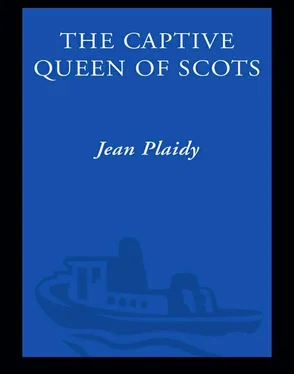Виктория Холт - The Captive Queen of Scots
Здесь есть возможность читать онлайн «Виктория Холт - The Captive Queen of Scots» весь текст электронной книги совершенно бесплатно (целиком полную версию без сокращений). В некоторых случаях можно слушать аудио, скачать через торрент в формате fb2 и присутствует краткое содержание. Жанр: Исторические любовные романы, на английском языке. Описание произведения, (предисловие) а так же отзывы посетителей доступны на портале библиотеки ЛибКат.
- Название:The Captive Queen of Scots
- Автор:
- Жанр:
- Год:неизвестен
- ISBN:нет данных
- Рейтинг книги:3 / 5. Голосов: 1
-
Избранное:Добавить в избранное
- Отзывы:
-
Ваша оценка:
- 60
- 1
- 2
- 3
- 4
- 5
The Captive Queen of Scots: краткое содержание, описание и аннотация
Предлагаем к чтению аннотацию, описание, краткое содержание или предисловие (зависит от того, что написал сам автор книги «The Captive Queen of Scots»). Если вы не нашли необходимую информацию о книге — напишите в комментариях, мы постараемся отыскать её.
The Captive Queen of Scots — читать онлайн бесплатно полную книгу (весь текст) целиком
Ниже представлен текст книги, разбитый по страницам. Система сохранения места последней прочитанной страницы, позволяет с удобством читать онлайн бесплатно книгу «The Captive Queen of Scots», без необходимости каждый раз заново искать на чём Вы остановились. Поставьте закладку, и сможете в любой момент перейти на страницу, на которой закончили чтение.
Интервал:
Закладка:
The priest’s eyes glowed. This was a mission which greatly appealed to him, although he knew that he was playing only one small part in it.
“And the letters which I receive I bring to you?” he asked.
Walsingham nodded. “And when I have examined their contents you will take them to the Queen of Scots with a letter from Morgan recommending you to her.”
“I shall win her confidence with the greatest ease,” Gifford added. “I have an uncle living not ten miles from Chartley where I understand the Scottish woman is now imprisoned.”
“I am sure you will act with your usual good sense. It is important that none should guess that you work for me, but there is one however whom we must take into our confidence. That is Sir Amyas Paulet. I shall write to him to tell him that you will be coming to Chartley in due course. Together you and he must devise a way for the Queen to smuggle letters out of Chartley which will seem plausible to her. She will think they are being taken to Morgan and her friends abroad. Some may reach them, but first they will pass through my hands.”
“I understand,” said Gifford.
“Then be on your way. Our work may be of long duration and I fear there is danger in delay.”
When Gifford had gone, Walsingham sat alone for some time deep in thought. He was setting the snare which he believed would soon be closing about his prey.
CHARTLEY WAS A PLEASANT CHANGE from Tutbury. Situated on a hill rising from a fertile plain, it was about six miles from the town of Stafford, and from its windows Mary had views of magnificent scenery.
She had liked the circular keep and round towers as soon as she had set eyes on them; but perhaps almost anything would have pleased her after Tutbury.
Her spirits were high and to some extent this helped her to forget her pains; and the fact that Sir Amyas was also complaining of his rheumatism made her feel that, suffering in similar fashion, he would be more inclined to have sympathy for her. This was not the case however, and he displayed a malignant pleasure because she was more affected by this disease than he was.
But almost as soon as the royal party arrived at Chartley, life seemed to become more exciting.
The first pleasant happening was when Barbara Curle confided to Mary that she was pregnant. Mary was delighted in the happiness of the young people and immediately began making plans for the birth of the child. The sullenness of Bessie though was becoming more apparent, and this disturbed Mary; she made up her mind that she must not allow Bessie to think that Barbara, a newcomer, had usurped her place in the Queen’s affections.
Another of her ladies, Elizabeth Curle, sister of Gilbert, became engaged to Andrew Melville, her Master of the household; and it was a great pleasure to Mary to see the happiness of those about her.
The third excitement was the arrival at Chartley of a priest whose uncle lived some ten miles away.
Sir Amyas, after what seemed like a good deal of deliberation, allowed the priest to visit her. It was always a comfort to talk with a Catholic priest, and Mary welcomed the man with great warmth; but when they were alone together and she heard what he had to say, her pleasure intensified.
“Your Majesty,” Gifford told her, “I have been recently in France and while there had conversation with a certain Thomas Morgan who is lodged in the Bastille.”
“I know of him,” replied Mary, and she was trembling a little.
“He gave me this letter to give to you.”
Mary took the letter he held out to her, and read that the bearer was one Gilbert Gifford, a priest of the Roman Catholic Church, a man in whom she could place her complete trust.
The color had come into Mary’s cheeks; all the excitement of the old days was returning. This was as it had been when she had been young and full of hope, and had believed she had many friends eager to help her. So she still had friends. This was the most wonderful news she had had for a long time, and she was intoxicated with dreams of freedom.
“I will see that any letters you wish to write to your friends are delivered,” he told her.
She shook her head. “I am indeed a prisoner now as I never was before. Since Sir Amyas Paulet has been my jailor I have no means of sending letters to my friends; and if you come here often you would quickly fall under suspicion. Even now you may be searched before you are allowed to leave. The very fact that you are of my faith will arouse suspicions against you.”
“Your Majesty, I have thought of this and talked of it with your friends. You have rich and powerful friends, but you have humble ones also. There is a brewer in the nearby town of Burton—an honest man—who sends you your beer . . . he is your friend.”
“How do you know this?”
“Because I have long sought means of helping you. Cautiously I made my discoveries. This brewer has promised to conceal a box in one of the barrels. It will contain letters from those who wish to see you free. This box can be taken from the barrel when it arrives at the castle. And when you write your replies, you will place them in the box and put it in the empty barrel which will be taken away by the brewer when he comes to collect them. He will pass these letters to me.”
“That is a clever notion.”
“I agree with Your Majesty and I shall see that they reach the persons for whom they are intended. To whom would Your Majesty wish to write?”
Mary considered. “To the Duke of Guise who will have heard rumors of my life here, and mayhap none of them true. To Archbishop Beaton, and of course to Morgan to thank him for sending you to me.”
Gifford nodded. “Have no fear. Paulet will never suspect. The next time the barrels are delivered you will find the box and I doubt not that Your Majesty will soon be putting it to good use.”
Thus Mary felt that in coming to Chartley she had begun to live again.
WALSINGHAM WAS RESTIVE. The plan was a good one, he was ready to admit, but it was moving too slowly. Mary was writing her letters which were passing by means of the brewer into Gifford’s hands; they were then conveyed to Walsingham and opened by one of his men who was skilled in the art of breaking seals and resealing in such a manner that it was impossible to discover they had ever been broken. However, many of the letters were in ciphers and the Queen did not always use the same one. Walsingham employed one of the best decipherers in the country, a man named Phillips, but even he found difficulty in decoding some of the letters.
This it was which slowed down the progress, and Walsingham decided that he could not get very far until he was in possession of all the Queen’s ciphers. He had for some time been watching an attaché in the service of the French embassy, for he believed a time would come when he could use this man. Walsingham prided himself that he could pick a bribe-taker at a glance, and Cherelles he believed to be one.
Now if Cherelles could be persuaded to visit Mary with letters from the King of France say, and asked her for the keys to the ciphers, she would not hesitate to give them. And for such a service what would Cherelles want? Say two hundred crowns? It would be money well spent.
MARY WAS DELIGHTED TO RECEIVE A VISIT from Cherelles. He brought with him letters from the King of France which were always a comfort to her. He listened sympathetically to an account of her sufferings and promised to do all he could to bring them to the notice of those who could help to alleviate them.
“There is one matter which has grieved some of your friends,” he told her. “They have been unable to decipher certain of your letters.”
“Is that so?” asked Mary surprised. “I must speak to my secretaries. I am sure they have introduced nothing new into the ciphers.”
Читать дальшеИнтервал:
Закладка:
Похожие книги на «The Captive Queen of Scots»
Представляем Вашему вниманию похожие книги на «The Captive Queen of Scots» списком для выбора. Мы отобрали схожую по названию и смыслу литературу в надежде предоставить читателям больше вариантов отыскать новые, интересные, ещё непрочитанные произведения.
Обсуждение, отзывы о книге «The Captive Queen of Scots» и просто собственные мнения читателей. Оставьте ваши комментарии, напишите, что Вы думаете о произведении, его смысле или главных героях. Укажите что конкретно понравилось, а что нет, и почему Вы так считаете.










